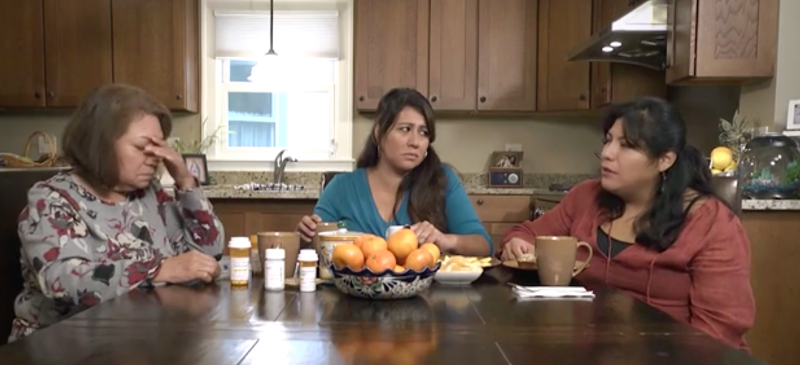Twenty percent of U.S. kidney disease patients on the current United Network for Organ Sharing (UNOS) transplant waiting list are Latino, but in California that rate is twice that, about 40 percent, which roughly matches the percentage of Latinos in the state, said Charlene Zettel, CEO of Donate Life California, the parent organization of Living Donation California, a San Diego-based nonprofit that offers referrals and resources for living kidney donations.
While researchers aren’t fully sure why Latinos are so severely affected by kidney disease, rates of high blood pressure and diabetes are also elevated among Latinos, and both conditions are key contributing factors. In addition, large numbers of Latinos lack health insurance, which can prevent getting timely care and can aggravate chronic diseases.
Need For Live Donors
Yet Latinos are less than half as likely as non-Latino whites to get a transplanted kidney from a live donor. That’s an important distinction because almost 6,000 kidney transplants annually are from live donors, close to a third of all kidney transplants, according to UNOS.
Part of that discrepancy is because of cultural concerns about transplants — and especially about live donor kidney transplants, researchers say.
Elisa Gordon, an associate professor of surgery at Northwestern University, led the development and testing of Infórmate. She said many Latino families are afraid that donation can decrease virility and fertility. Other believe the Catholic Church opposes it or that becoming a donor could trigger a report to immigration officials. None of those are true.
In addition, many Latinos worry about related costs and don’t know that insurance generally covers most of the expenses for both the donor and recipient.
Infórmate deals with all those issues. Besides the telenovelas, the site includes quizzes and games to help dispel cultural and religious myths and video testimonials in English and Spanish from donors and recipients. It also has information on financial issues and links to help patients find transplant centers.
Dr. Elena Rios, CEO of the National Hispanic Medical Association, said the telenovelas are an especially important feature of the site because they are “familiar.” Many Latino families watch television together so the stories are likely to generate conversation, she said.
Zettel said her group has added a link to Infórmate on the site’s resources page. “We’ve long needed more targeted information health care professionals can use to better inform their Latino patients about live kidney donation,” she said.
Both UC Davis and Northwestern University transplant centers also have added Infórmate to the resources that they offer Latino patients. Researchers at the centers conducted a study that found the website increased knowledge about live kidney donation among Latino patients and their family members.
Javier Oregel, 34, of Yuba City, north of Sacramento, undergoes daily dialysis and said he learned of the site from the staff at UC Davis. Oregel became too sick to work in his job as a farmworker and receives medical benefits through Medicare and Medi-Cal, California's version of Medicaid. Through a translator, Oregel explained that before scrolling through Infórmate, all the information he had on kidney transplants came from talking with the transplant center staff. Infórmate allows him to get information himself, in Spanish.
He is on the UNOS list for a kidney transplant and is worried about what expenses will fall to him. Although his insurance will pick up much of the medical costs, he learned on Infórmate about some of the out-of-pocket spending that a surgery would entail. The site provided him with links to organizations that take applications to help cover those costs — even the bill for the hotel room his wife will need if he gets the transplant.
“If a transplant become available, I know I can go back to the Infórmate site to follow up on those resources,” Oregel said.
Paying For A Transplant
Kidney transplants cost $150,000 to $250,000, according to information on Infórmate, not including about $20,000 per year for medication and other expenses necessary for the rest of a recipient’s life. Health plans usually cover dialysis and transplants, as does Medi-Cal.
Immigrants living in the country illegally who don't have insurance are generally eligible only for emergency treatment in hospitals. A handful of states, including California, offer coverage of dialysis on an outpatient basis under certain circumstances.
Yet dialysis is just a stopgap measure until a donated kidney — either from a live person or from someone who has died — can be found. The average wait for a deceased person’s kidney is 3½ years.
Kidney transplants save money over the cost of dialysis, but that’s not why medical officials favor them, said Luke Preczewski, executive director of the kidney transplant center at UC Davis. “We do them because research shows that transplants offer a longer and better quality life.”
“Live kidney donations generally come from family members, who are the most likely to be a genetic match, but [they] often come from spouses, friends and even strangers,” said Juan Caicedo, director of the Hispanic Transplant Program at Northwestern Memorial Hospital and a co-developer of the Infórmate site.
